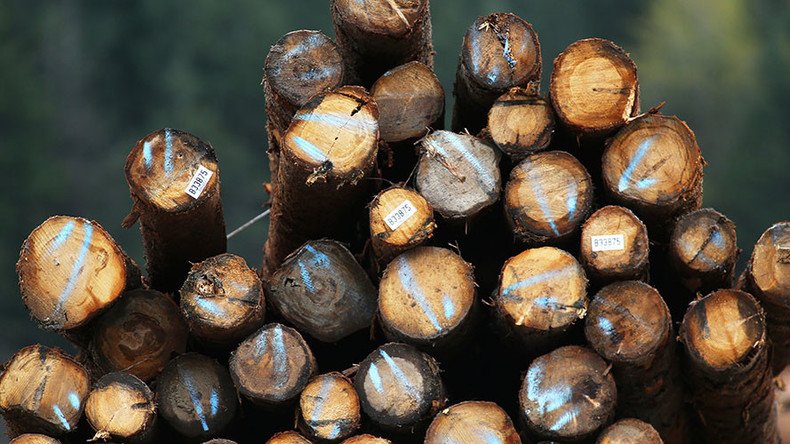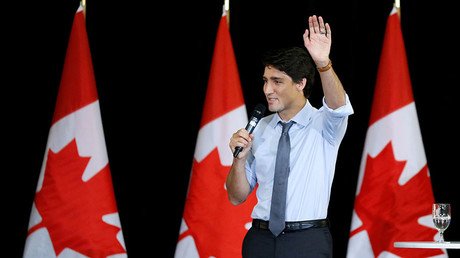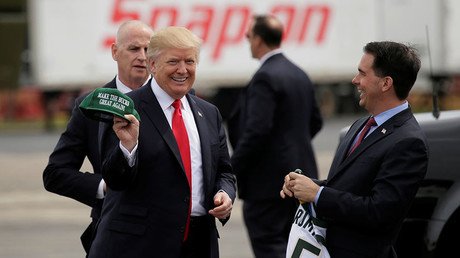Trump & Trudeau in ‘war of words’ on trade, as US places 20% tariff on Canadian lumber

President Donald Trump has railed against Mexico and China for unfair trade policies but saved the first tariffs for Canada. Canadian Prime Minister Justin Trudeau predicts Trump’s action will “thicken” the border between the two countries.
On Monday, the Department of Commerce announced the Trump administration would impose a 20 percent tariff on Canadian softwood lumber, including specific tariffs for five Canadian lumber firms that range from three to 24 percent.
At Tuesday’s White House press briefing, Secretary of Commerce Wilbur Ross told reporters the taxes were being imposed, because Canada had “violated legitimate practice.”
Ross explained how the dispute over lumber has been waging for decades. In Canada, the provinces subsidize the lumber industry allowing them to charge a lower subsidized price on exports to the US. Ross said the price difference is as high as 25 percent and an average of 20 percent.
To combat the effect, Ross said that the US would impose a 20 percent tariff on Canadian soft lumber, which would bring in $1 billion a year. However, the tariff would also create slightly higher prices for Americans buying the lumber. He also said the measure would be retroactive, going back 90 days, which would bring in an additional $250 million.
Trump first announced the tariffs at a private meeting with conservative journalists in the White House shortly before Ross made the announcement. Trump told reporters that the levies were designed to allow Americans to compete with their northern neighbors.
“It means we’re going to start doing lumber in our country, it’s going to mean that farmers are going to start selling milk in our country,” Trump said, according to Breitbart News, one of the conservative media outlets invited to the meeting.
TRUMP: “We’re going to be putting a 20% tax on softwood lumber coming in — tariff on softwood coming into the United States from Canada"
— Charlie Spiering (@charliespiering) April 24, 2017
On Tuesday, Trump took to Twitter to denounce Canada’s trade policies involving dairy products, which he said have “made business for our dairy farmers in Wisconsin and other border states very difficult.”
“We will not stand for this. Watch!” Trump tweeted.
Canada has made business for our dairy farmers in Wisconsin and other border states very difficult. We will not stand for this. Watch!
— Donald J. Trump (@realDonaldTrump) April 25, 2017
Canada has imposed charges on dairy products entering the country, some of which are as high as 270 percent, according to Reuters.
In a statement issued by the Department of Commerce, Ross said Canada’s policies “effectively cut off the last dairy products being exported from the United States.”
“This is not our idea of a properly functioning Free Trade Agreement,” Ross said.
Trump’s stance also received strong bipartisan support from political leaders, including Wisconsin Governor Scott Walker (R) and Senator Charles Schumer (D-New York).
Been fighting for NY dairy farmers on this. Glad to see @POTUS join our fight to change Canada's unfair policy that undercuts our farmers. https://t.co/SbdrhnhPOa
— Chuck Schumer (@SenSchumer) April 25, 2017
.@realDonaldTrump@POTUS It was great to talk to you this morning. Thanks for supporting WI dairy farmers!!!
— Scott Walker (@ScottWalker) April 25, 2017
Last week, Trudeau said the US has a $400 million dairy trade surplus with Canada, and said, “it’s not Canada that’s the challenge here,” according to Bloomberg.
On Tuesday, Trudeau held a press conference, where he said the tariffs could lead to Canada and the US suffering from a “thickening” of the border due to the tariffs.
“There are millions of good US jobs that depend on the smooth flow of goods, services, and people back and forth across our border,” Trudeau said, according to the Associated Press.
“You cannot thicken this border without hurting people on both sides of it,” Trudeau added. “Any two countries are going to have issues that will be irritants to the relationship. Having a good constructive working relationship allows us to work through those irritants.”
Trump blamed both trade deals on the North American Free Trade Agreement (NAFTA), which he has said will soon be renegotiated.
Last week, Trump signed an executive order on the Trade Expansion Act. At the signing, Trump called NAFTA “a disaster” and told reporters he was “not going to let it continue onward.”
“The fact is, NAFTA – whether it’s Mexico or Canada – is a disaster for our country. It’s a disaster. It’s a trading disaster. And we’ll be reporting back sometime over the next two weeks as to NAFTA and what we’re going to do about it,” Trump said, according to the White House.














